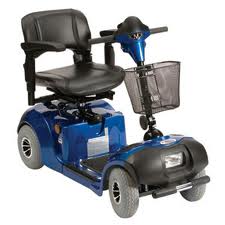He motored into Starbucks on a blue plastic contraption that looked like an adult’s Go-Kart, parking next to our table. His hair was not yet grey, his skin a weathered brown, with a moustache that showed he still bothered to shave. Perhaps he had been handsome in his youth, tall with a large build, but age and disability had worn down his muscles. He shifted his weight, trying to swing his bandaged right leg to the other side. After much difficulty, he clambered off his motorised device.
Two plastic Singapore flags poked out from his basket which was otherwise empty. No, he didn’t want me to buy tissue from him. He just wanted to sit at our table. I removed my bags from the chair next to me and gestured for him to take the seat.
He didn’t sit down immediately. He reached for his walking stick, hung over the back of his scooter. Making a clumsy U-turn, he turned around, then hobbled to the counter behind me. Several minutes later, he returned with a steaming mug of green tea. I glanced at him, wondering if he needed any help. No, I thought to myself. The disabled don’t need your sympathy. He set the mug on the table and sunk into the chair, his bandaged right leg sticking out into the aisle. I noticed his right hand was bandaged as well.
I returned to the project on my screen, turning up the volume on my headphones. I was in the middle of an important scene and wanted to get the words out before the inspiration went away. After a few minutes of harried typing, I noticed the man glancing at my computer screen. Was he trying to read my story? That sort of thing annoyed me to no end. But he looked away, this time glancing at my friend sitting across the table. Our eyes met in a knowing look, and we each returned to our work in front of us.
Ten minutes later, I glanced to my side. The man was still in his seat, the mug of tea untouched. He held a red phone in his left hand now, a cheap plastic handset that could only make calls. There was a crack on his screen. He alternated between glancing at me, my friend and his phone. I was beginning to feel unnerved. Worse still, he smelled like he hadn’t taken a shower in a week, an awful salty sour stench that made my stomach churn. Why on earth would someone like him come to Starbucks for a cup of tea?
I got up from my seat and went for a toilet break, taking my time to return. But he was still there, the mug of tea untouched.
By now, my friend and I were truly confounded. She suggested we leave as it was near dinner-time and getting very crowded. I asked her to wait while I texted my husband. Ten minutes later, we began packing our belongings. I reached under the table and disconnected our power cables, returning my friend hers and bundling mine into my bag.
The man removed a dirty green pouch from his scooter. First he took out a large black rectangular object that looked like some sort of converter, next a power extension cord, then more cables. Was he going to take out a laptop next?
We watched, first with surprise as he began connecting the pieces together, then with a deepening sense of shame as he plugged one end of his bundle of cables into the socket under the table, the other to his scooter.
“Uncle,” I spoke to him, making sure to smile. “Aiyah, you should just have told us you needed to charge your scooter.”
He opened his mouth to reply. And then I realised why he hadn’t said anything the whole time. He had no teeth. I couldn’t understand a word he was saying.
Would we have behaved differently if he wasn’t handicapped? If he wasn’t in bandages? If he didn’t smell wrong? Why didn’t we realise what he wanted earlier? Had I known, I would have bought him a cup of tea. Had we known. But we were sitting there the whole time, and we averted our eyes.
